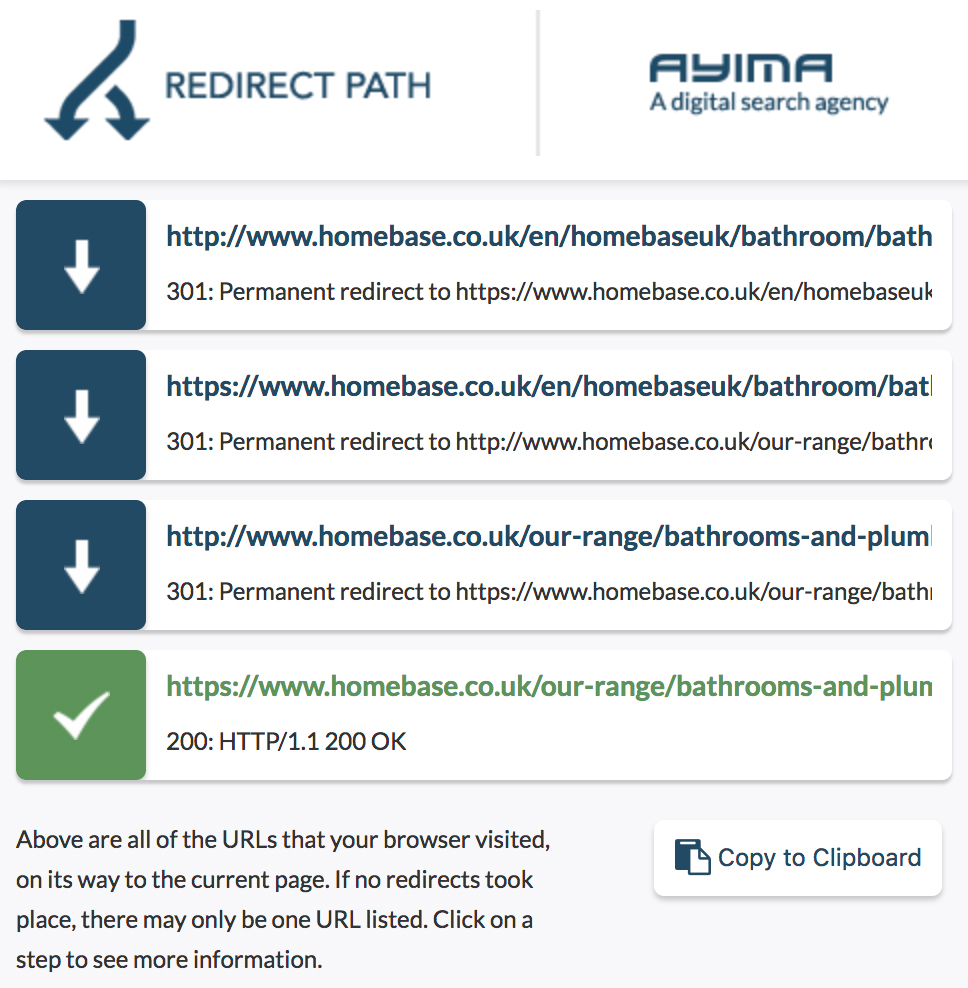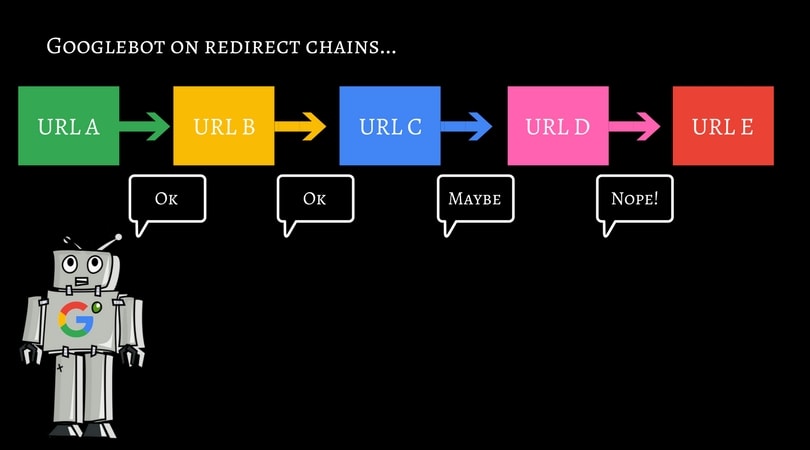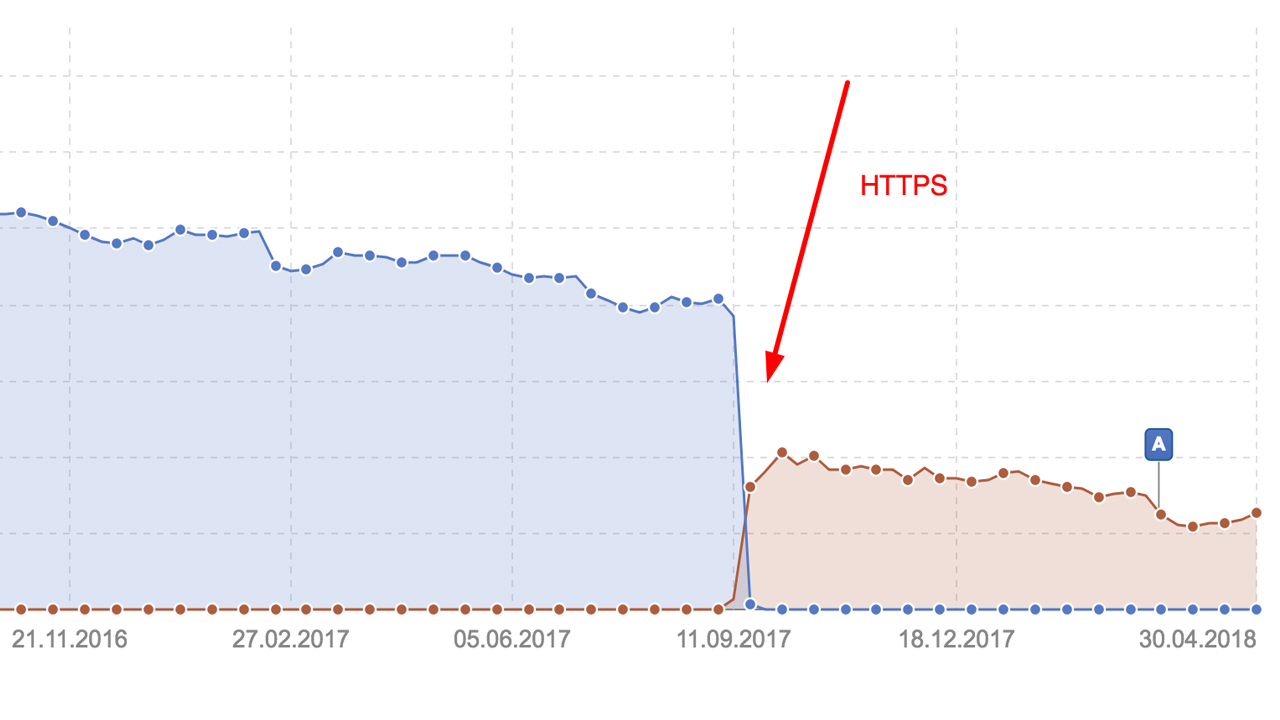The Homebase website was already dying….why kill it with a bad https migration?!
I am sure you’re wondering how a process that’s supposed to boost your site’s rankings could possibly send them plummeting instead.

Here are some observations:
First, we see pages that are being redirected 4 times – yes 4 times – before reaching their final destination, e.g. http://www.homebase.co.uk/en/homebaseuk/bathroom/bathroom-accessories/bathroom-essentials.

From my experience redirect chains do not affect small websites much. Unfortunately for Homebase, their website is big.
When it comes to big websites crawl budget is vitally important.
Every redirect wastes a little bit of a website’s crawl budget. When a website has long redirect chains, i.e. a large number of 301 and 302 redirects in a row, the Googlebot may drop off before it reaches the desired destination page, which means that important business pages may not be indexed. When it comes to redirects have as few as possible on your website, and no more than two in a row.

How many redirects can you do at the same time? We follow up to 5 in a chain (please keep any redirect chain as short as possible), but you can redirect as many URLs on your site as you want at the same time. – JohnMueller, Google
If we deep dive into these redirects it is also quite noticeable that the redirects go from HTTP to HTTPS and then again to HTTP and then again to HTTPS. Not sure why an SEO would do that but at this point, it’s very obvious that there was no HTTPS migration plan in place.
A successful website migration starts with planning – Omi Sido
Could this be the reason for their rankings going in the tank?
Yes and no (this is not the only reason).
Carefully looking at the same starting page http://www.homebase.co.uk/en/homebaseuk/bathroom/bathroom-accessories/bathroom-essentials you will probably notice that the original page is targeting the keyword ‘bathroom accessories’ with a search volume of 27 000

and the ‘new’ page is targeting a keyword with a search volume of 14,800.

At this point, I am laughing…
Who is advising these people?
Going into more detail, let’s have a look at the history of the keyword ‘bathroom accessories’ that for many years was always ranking in the top 3 positions for Homebase.
We can now see what is going on here:

Only a week after the HTTPS migration Homebase went from position 3 to position 21 in the SERPs and few months down the line Homebase is ranking in position 97 for the keyword “bathroom accessories”.
It makes you think why they didn’t redirect http://www.homebase.co.uk/en/homebaseuk/bathroom/bathroom-accessories/bathroom-essentials to https://www.homebase.co.uk/our-range/bathrooms-and-plumbing/bathroom-accessories-and-decor.
( It’s not very clear from the picture above but at one point between December 2017 and February 2018, this page was indeed ranking for the keyword “bathroom accessories” in position 30)
As this is not enough another page (www.homebase.co.uk/en/static/bathroom-ideas) targeting the keyword ‘bathroom ideas’ with a search volume of 60,500 is now redirecting to the home page. Lol and LOL.
I explicitly told you last year – https://youtu.be/jtgZ5dxYbHM?t=782 – not to redirect pages to the Homepage when migrating your website.
Can these costly mistakes Be Fixed?
If your SEO or web developer mishandles your site migration, can the mistakes be rectified? Of course. In many cases of an HTTPS migration gone wrong, I’ve been working with clients for some time, and we’ve made significant progress.
The real issue is that the ranking destruction done by a website migration gone wrong is almost always a long-term issue.
Finding and repairing the problems isn’t particularly complicated. You just have to look at the stats and everything becomes clear very quickly.
But improving your site’s reputation (especially in a competitive market) with a search engine once’s it’s damaged can be a very slow process, and of course completely at their discretion.
Fixing the technical SEO issues that caused Google to lose trust in your website isn’t enough. A business needs to give Google a good reason to start trusting its content again but also let’s not forget that while your pages were ‘away on holiday’ somebody else took your position in the SERPs.


Leave a Reply